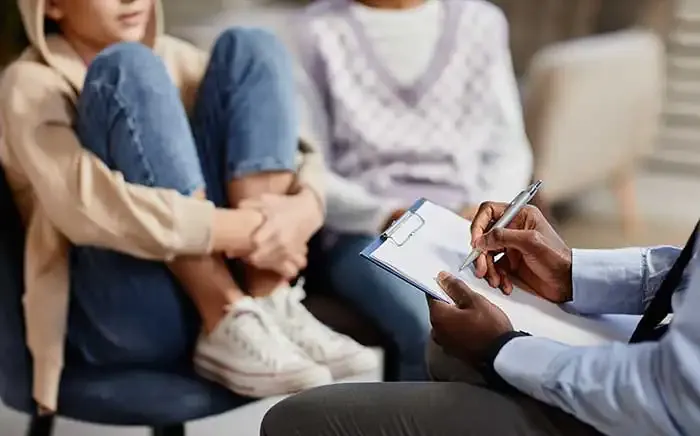Youth AOD services

There are many different types of AOD support options for young people.
- Outreach support - Youth AOD outreach workers meet with young people at home, school, cafes, parks, etc. to provide non-judgemental counselling and support for AOD use
- Centre-based counselling and case management - Youth-friendly, non-judgemental centre-based support for young people experiencing AOD needs
- Dual diagnosis counselling and case management - Counselling and support for young people experiencing co-occurring mental health and AOD needs. Many youth AOD services now provide dual diagnosis counselling and support, or work closely with mental health services to provide integrated care
- Family-focused counselling - Counselling involves the young person together with parents and/or significant others, so the family can work to improve relationships, increase understanding of issues and support the young person’s treatment goals
- E-support - Online or phoneline support
- Day programs and ‘drop in’ centres - Safe non-judgemental spaces, staffed by AOD and youth workers, where young people with AOD issues can go during the day. Suitable for young people not engaged in school or work, and who have limited supports. Young people participate in structured programs, recreational activities or access services such as primary health, therapeutic support or basic needs like showers and washing machines
- Home-based withdrawal - A young person is supported by outreach workers to help them withdraw safely at home
- Youth residential detoxification programs - (for ages 12–21 or 25, depending on the service provider) Safe and supportive environments, staffed 24/7 by youth AOD workers, where a young person can stay for up to two weeks to withdraw from alcohol or other drugs.
- Youth residential rehabilitation - (for ages 16-20 or 25, depending on the service provider) A young person lives with a group of others in 24 hour accommodation, staffed by AOD support workers, to help them achieve their treatment goals. Involves a structured therapeutic program, i.e. psychosocial education, life skills, group and individual therapy, art, music, animal care, etc
- Aboriginal and Torres Strait Islander residential rehabilitation - (for ages 16-25) Bunjilwarra Koori Youth Alcohol and Drug Healing Service is a 12 bed residential rehabilitation service for Aboriginal young people (Vic. based)
- Dual diagnosis/integrated care models - A holistic approach that focuses on treating a young person’s AOD and mental health needs at the same time
- Young parents’ program - Supports young people who are pregnant or parents and experiencing substance use needs
- Forensic support - AOD-focused programs and support for young people engaged in the juvenile justice system.
If the service accessed isn’t quite the right fit for the young person, let them or their parents/carers know there are other workers or other services available and encourage them to keep trying until they find a worker or service that is the right fit.
Referral pathways for young people with AOD or co-occurring needs and their family/friends
YoDAA (Youth Drugs and Alcohol Advice) | Online resources and phoneline support for young people and concerned parents/carers Referrals to local youth-focused support services | 1800 458 685 https://yodaa.org.au |
|---|---|---|
headspace | Specialises in engaging young people with concerns relating to mental health, physical health and alcohol and other drugs | 1800 650 890 https://headspace.org.au |
Family Drug Help | 24hr phoneline providing practical help, information and support to families and friends affected by someone’s alcohol or other drug use | |
Path2Help | Online tool providing tailored support and information to the specific needs of family and friends of someone who uses alcohol and other drugs |
RACGP Alcohol & Other Drugs GP Education Resource Library
- Resources for GPs to support patients who use alcohol and other drugs
- Resources include clinical approaches, patient handouts and case scenarios.
Alcohol and Drug Foundation
- Evidence-based information on alcohol and other drugs
- Includes comprehensive Drug Facts pages, harm reduction information, information for family and friends, ADF Library, translated materials, webpages on topical AOD issues and where/how to access help and support.
Talk about it – A guide to having open conversations about alcohol and other drugs with young people
- Developed to help parents and carers talk to their children about alcohol and other drugs
- Explores how to have these conversations with young children through to teens, why young people might use alcohol and other drugs, and how to recognise when a young person may need help.
Text the Effects
- Anonymous SMS service that provides confidential info about the effects of drugs and harm reduction information in a quick and easy way
- Simply text the name of the drug you want to know more about for an immediate answer – anywhere, anytime.
Alcohol, Other Drugs and Mental Health Needs in Young People
- Written resource exploring the relationship between AOD use and mental health in young people.
Positive Choices
- Drug and alcohol information designed for teachers/schools, parents/families, students, culturally and linguistically diverse people, and Aboriginal and Torres Strait Islander Peoples
- Includes drug facts pages, webinars and resources on how to have the AOD conversation with young people.